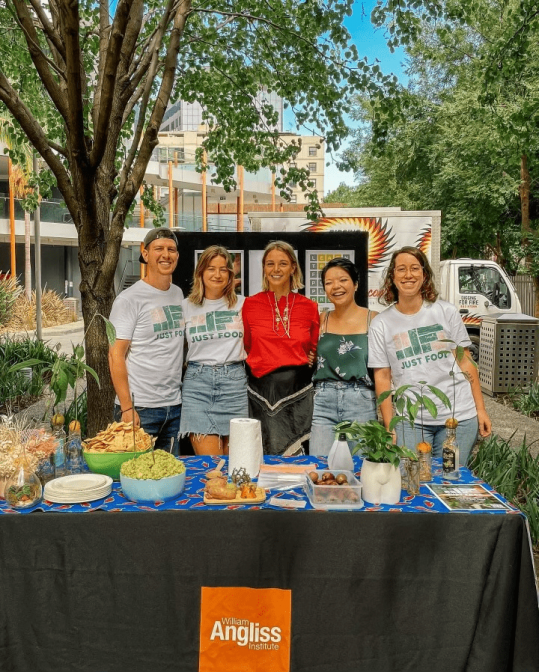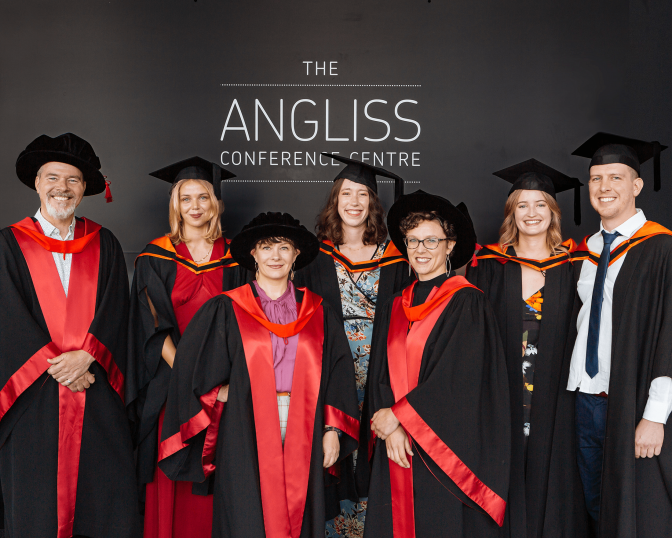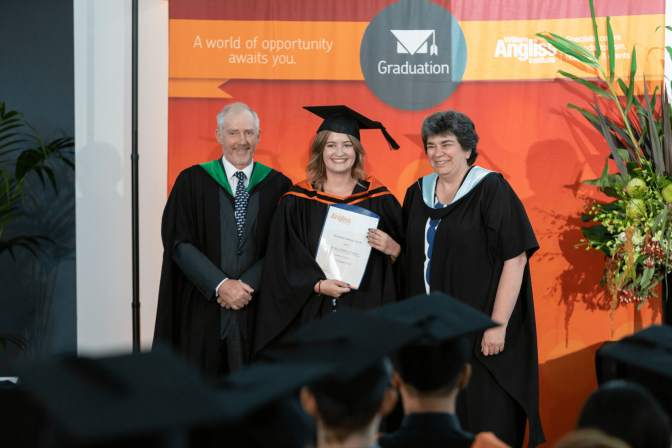An undergraduate in Food Studies taught me the theory, but my mentors at Sustain showed me how to make change happen
Savannah Supski, Just Food CollectiveSavannah Supski has always been passionate about food and justice. In 2019 she embarked on Bachelor of Food Studies, and met Dr Nick Rose and Dr Kelly Donati from Sustain. With Nick's encouragement and mentorship, Savannah and her peers co-founded Just Food Collective, a youth-centred food justice not-for-profit group. As Nick facilitated Just Food's first opportunities, Savannah gained invaluable work experience and later joined the team at Sustain. Her time at Sustain enabled her to do what she loves: work with food and with make change within the community.
As she graduates this week, Savannah reflects on her journey and lessons over the past four years.
I have known two things about myself for a long time: I am obsessed with food, and I am an activist. I wrote my first recipes and designed my first restaurant before I was ten, and was a part of a national poverty-advocacy program by thirteen. By fifteen I had travelled from Melbourne to Canberra on the Make Poverty History Road Trip, petitioning to raise Australia’s federal aid contribution. At the end of that year, I made national headlines as I fought for LGBTQIA+ equality at my high school.
After graduating from high school I worked as a chef in various restaurants and cafes across Australia. By 2018 I was burnt out from the hospitality scene, humiliated by homophobia and sexism in the workplace, and ready for change.
Googling what I could do next, I came across the Bachelor of Food Studies at the William Angliss Institute in Melbourne.
It was a love affair from the first day – if you'd told me I would graduate as Dux, I probably would have believed you. I sat in the first class of Culture and Cuisine with my jaw open; it was like the degree was written just for me (an experience shared by many Food Studies students). Most of us were chefs or highly involved in food, but we all wanted something more out of it.
Food studies is a relatively new academic research field, and the first degree of its kind in Australia. What better way to learn about our society’s systems, hierarchies, and inequities than through the lens of food: something humans cannot live without?
Our core teachers, Dr Kelly Donati and Dr Nick Rose were my biggest mentors and extended their support beyond the classroom. Owing to one short fermentation assignment and Kelly’s guidance, I published a piece in a journal alongside her, Sandor Katz, Lisa Heldke and others.
Kelly and Nick offered me my first research gig through Sustain to conduct food environment mapping and healthy food basket analysis in Maribyrnong. Nick supported the creation of Just Food Collective. Their support and encouragement was more than I ever expected.
Just Food came about because halfway through the degree, I wondered what we would do with all of this knowledge. It was a waste to wait until we graduated to use it, and I wasn’t the only one thinking this. We asked Nick, “What can we do?”, and he replied, “start a student movement”. So we did.

In the beginning we imagined Just Food as a student group at William Angliss. As we engaged with the Institute and Just Food started getting opportunities for action, we realised we wouldn’t just be a student group. We would be an independent food justice organisation.
In our first year, we learnt about not-for-profits, how to start an organisation, how to write mission statements and guiding principles. We learnt leadership skills, project planning and how to engage with stakeholders.
In just the second year we learnt how to write grants, quantitative research skills, how to plan events, workshops and research projects, evaluation skills and volunteer management.
By the time I was in my fourth year I was more than prepared for a career in food studies, working as a research assistant at Deakin University with Fiona McKay on a project investigating the effects the pandemic had on emergency food relief organisations. and with the Australian Women’s and Gender Studies association, planning for their biennial conference.
I also took on my own research project: ‘Fed Up! Student food insecurity at William Angliss Institute’. Guided by Nick, I worked alongside Patrick McMillin and Sara Guest on this important project which took on three stages: a seminar, a survey, and co-designed recommendations with students at William Angliss. The report was presented to William Angliss, who see the recommendations as a great opportunity to become a leader in the fight for student food security.

This week, I finally graduated. I have started working for Sustain on the City of Casey’s Food Security Framework: a dream come true after many assignments on policy making and collective impact.
Today, we live in an increasingly challenging world. The pandemic showed us how fragile our industrial food system is, and after recent floodings across Australia, additional supply chains were disrupted with farmland and produce destroyed. Food security continues to be both a household and national concern, compounded by the rising cost of living and worsening environmental stability. For me, a Food Studies graduate, none of this is a surprise. I learnt about our system’s inequities and what will happen if we continue to push our planetary boundaries. Our teachers told us these challenges were inevitable – food studies scholars have been writing about the effects of our corporate food regime and industrial agriculture mindset for decades.
However, the most important lesson has been to never lose hope. My teachers and other Food Studies activists have the solutions. The degree taught us what we, our communities, the government, and corporations can do to create a fair and sustainable food system. There is hope because the answers are already there. I am so excited to be a part of the solution through my work with student food insecurity, government policy making, and whatever else is to come.
About the author: Savannah Supski

Savannah is a recent graduate in Bachelor of Food Studies at the William Angliss Institute, Melbourne. She is currently a research fellow at Deakin University looking at emergency food relief in Victoria, and leading the Fed Up! student food insecurity research project at William Angliss. Her passions lie in food justice, workers’ rights and food policy. In her lifetime she hopes to see a society guided by principles of equality and love, rather than the greed-driven system we currently live in.